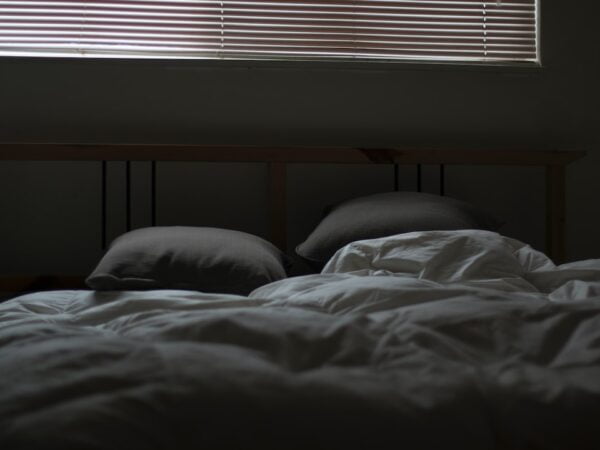
Unlock the Secrets to Sleeping Well: Tips and Tricks for a Restful Night’s Sleep
Sleep is a fundamental aspect of our lives that is often overlooked or undervalued. It is essential for our overall health and well-being, playing a crucial role in various bodily functions. When we sleep, our bodies have the opportunity to repair and rejuvenate, allowing us to wake up feeling refreshed and ready to take on the day.
On the other hand, sleep deprivation can have serious negative effects on our physical and mental health. Lack of sleep can lead to decreased cognitive function, impaired memory, mood swings, and increased risk of accidents. It can also weaken our immune system, making us more susceptible to illnesses and diseases.
Key Takeaways
- Sleep is crucial for overall health and well-being.
- Understanding the science of sleep can help improve sleep quality.
- Common sleep disorders have various causes and can be treated.
- Creating an ideal sleep environment and consuming certain foods and drinks can aid in better sleep.
- Regular exercise, relaxation techniques, and establishing a consistent sleep routine can all contribute to better sleep.
Understanding the Science of Sleep
Sleep is a complex process that consists of different stages, each with its own unique functions. The two main types of sleep are rapid eye movement (REM) sleep and non-rapid eye movement (NREM) sleep.
During NREM sleep, which accounts for about 75% of our total sleep time, our bodies go through three stages: N1, N2, and N3. N1 is the lightest stage of sleep, where we are easily awakened. N2 is a deeper stage of sleep where our brain waves slow down and our body temperature drops. N3 is the deepest stage of sleep, also known as slow-wave sleep, where our brain waves become even slower.
REM sleep, on the other hand, occurs about 25% of the time and is characterized by rapid eye movements and vivid dreaming. This stage is important for cognitive function and memory consolidation.
Circadian rhythms also play a crucial role in regulating our sleep-wake cycle. These rhythms are internal biological processes that follow a roughly 24-hour cycle and are influenced by external factors such as light and darkness. They help regulate our sleep patterns by signaling to our bodies when it’s time to sleep and when it’s time to wake up.
Common Sleep Disorders and Their Causes
There are several common sleep disorders that can significantly impact our sleep quality and overall well-being. Some of the most common sleep disorders include insomnia, sleep apnea, and restless leg syndrome.
Insomnia is characterized by difficulty falling asleep or staying asleep, leading to inadequate sleep quantity or quality. It can be caused by various factors such as stress, anxiety, depression, certain medications, or underlying medical conditions.
Sleep apnea is a disorder in which a person’s breathing repeatedly stops and starts during sleep. This can lead to loud snoring, gasping for air, and daytime fatigue. Sleep apnea is often caused by an obstruction in the airway or a problem with the brain’s signaling to the muscles that control breathing.
Restless leg syndrome is a neurological disorder characterized by an uncontrollable urge to move the legs, usually accompanied by uncomfortable sensations. This can make it difficult to fall asleep or stay asleep, leading to disrupted sleep patterns. The exact cause of restless leg syndrome is unknown, but it is believed to be related to abnormalities in the brain’s dopamine system.
Creating the Ideal Sleep Environment
| Factors | Recommendations |
|---|---|
| Temperature | Keep the room temperature between 60-67°F (15-19°C) |
| Noise | Use earplugs or white noise machine to block out noise |
| Light | Use blackout curtains or eye masks to block out light |
| Mattress | Choose a comfortable and supportive mattress |
| Pillows | Use pillows that support your neck and head |
| Bedding | Use breathable and comfortable bedding |
| Electronics | Avoid using electronics in bed |
| Bedtime Routine | Establish a relaxing bedtime routine |
Creating a comfortable and conducive sleep environment is essential for getting a good night’s sleep. The ideal sleep environment should be cool, dark, quiet, and free from distractions.
Temperature plays a significant role in our ability to fall asleep and stay asleep. The optimal room temperature for sleep is around 65 degrees Fahrenheit (18 degrees Celsius). It’s important to adjust your thermostat or use fans or blankets to achieve this temperature.
Light can also disrupt our sleep patterns by interfering with our circadian rhythms. It’s important to minimize exposure to bright lights before bedtime and use blackout curtains or eye masks to block out any external light sources.
Noise can be another major disruptor of sleep. If you live in a noisy environment, consider using earplugs or white noise machines to drown out any unwanted sounds. Additionally, it’s important to keep electronic devices such as phones and televisions out of the bedroom to minimize distractions.
The Best Foods and Drinks for a Good Night’s Sleep
What we eat and drink can have a significant impact on our sleep quality. Certain foods and drinks contain compounds that can promote better sleep.
Chamomile tea is a popular herbal tea that has been used for centuries as a natural remedy for insomnia. It contains apigenin, a compound that binds to certain receptors in the brain, promoting relaxation and sleepiness.
Magnesium-rich foods such as almonds, spinach, and bananas can also aid in sleep. Magnesium is a mineral that plays a crucial role in regulating neurotransmitters involved in sleep and relaxation.
Tryptophan-rich foods such as turkey, chicken, and dairy products can also promote better sleep. Tryptophan is an amino acid that is converted into serotonin and melatonin, two hormones that regulate sleep.
It’s important to note that consuming heavy meals or caffeine close to bedtime can interfere with sleep. It’s best to avoid large meals at least two hours before bed and limit caffeine intake in the afternoon and evening.
The Benefits of Regular Exercise on Sleep Quality
Regular exercise has been shown to have numerous benefits for sleep quality. Engaging in physical activity during the day can help regulate our circadian rhythms, making it easier to fall asleep at night.
Exercise also helps reduce stress and anxiety, two common factors that can contribute to insomnia. It releases endorphins, which are natural mood boosters that can promote relaxation and improve sleep quality.
However, it’s important to note that exercising too close to bedtime can have the opposite effect and make it harder to fall asleep. It’s best to finish your workout at least three hours before bed to allow your body temperature to cool down and your adrenaline levels to return to normal.
Relaxation Techniques for a More Restful Night
Relaxation techniques can be effective in promoting better sleep by reducing stress and promoting relaxation. Some popular relaxation techniques include deep breathing, progressive muscle relaxation, and guided imagery.
Deep breathing involves taking slow, deep breaths and focusing on your breath as you inhale and exhale. This can help calm the mind and relax the body, making it easier to fall asleep.
Progressive muscle relaxation involves tensing and then relaxing each muscle group in your body, starting from your toes and working your way up to your head. This technique helps release tension and promotes a state of deep relaxation.
Guided imagery involves visualizing peaceful and calming scenes or scenarios. This can help distract the mind from racing thoughts and promote a sense of calmness and tranquility.
Sleep Aids: Pros and Cons of Prescription and Over-the-Counter Options
Sleep aids can be helpful for those struggling with sleep disorders or occasional sleep disturbances. There are two main types of sleep aids: prescription medications and over-the-counter options.
Prescription sleep medications such as benzodiazepines and non-benzodiazepine sedatives can be effective in promoting sleep. However, they come with potential side effects such as drowsiness, dizziness, and the risk of dependence or addiction.
Over-the-counter sleep aids usually contain antihistamines, which can cause drowsiness and help promote sleep. These medications are generally safe when used as directed, but they can also cause side effects such as dry mouth, dizziness, and daytime drowsiness.
It’s important to consult with a healthcare professional before using any sleep aids to determine the best option for your specific needs. They can help assess the underlying causes of your sleep problems and recommend the most appropriate treatment.
Establishing a Consistent Sleep Routine
Establishing a consistent sleep routine is essential for better sleep. Our bodies thrive on routine, and having a set bedtime and wake-up time can help regulate our internal clock and improve sleep quality.
It’s important to set a regular bedtime and stick to it, even on weekends. This helps train our bodies to associate that time with sleep, making it easier to fall asleep and wake up naturally.
Creating a relaxing bedtime routine can also signal to our bodies that it’s time to wind down and prepare for sleep. This can include activities such as reading a book, taking a warm bath, or practicing relaxation techniques.
It’s also important to create a sleep-friendly environment in the bedroom. This includes keeping the room cool, dark, and quiet, as mentioned earlier. Additionally, it’s best to reserve the bedroom for sleep and intimacy only, avoiding activities such as watching TV or working in bed.
Troubleshooting Common Sleep Problems and Finding Solutions
There are several common sleep problems that many people experience at some point in their lives. Some of these problems include snoring, waking up frequently during the night, and difficulty falling back asleep after waking up.
Snoring can be caused by various factors such as obesity, alcohol consumption, or nasal congestion. Using a humidifier in the bedroom can help alleviate nasal congestion and reduce snoring. It’s also important to maintain a healthy weight and avoid alcohol before bed.
Waking up frequently during the night can be caused by factors such as stress, anxiety, or an uncomfortable sleep environment. Practicing relaxation techniques before bed can help reduce stress and anxiety levels. Creating a comfortable sleep environment by adjusting room temperature and minimizing noise and light can also promote uninterrupted sleep.
Difficulty falling back asleep after waking up can be caused by racing thoughts or an overactive mind. Engaging in relaxation techniques such as deep breathing or progressive muscle relaxation can help calm the mind and promote sleepiness.
Sleep is an essential aspect of our lives that should not be taken for granted. It plays a crucial role in our overall health and well-being, impacting various bodily functions. Lack of sleep can have serious negative effects on our physical and mental health.
Understanding the science of sleep and common sleep disorders can help us identify the underlying causes of our sleep problems and find appropriate solutions. Creating the ideal sleep environment, incorporating relaxation techniques, and establishing a consistent sleep routine are all important steps in improving sleep quality.
It’s also important to prioritize our sleep and make it a priority in our daily lives. By taking steps to improve our sleep quality, we can reap the numerous benefits that come with getting a good night’s sleep. So, let’s make sleep a priority and prioritize our overall health and well-being.
FAQs
What is the recommended amount of sleep for adults?
The recommended amount of sleep for adults is 7-9 hours per night.
What are the benefits of getting enough sleep?
Getting enough sleep can improve memory, concentration, mood, and overall health. It can also reduce the risk of obesity, heart disease, and diabetes.
What are some tips for improving sleep quality?
Some tips for improving sleep quality include establishing a regular sleep schedule, creating a relaxing bedtime routine, avoiding caffeine and alcohol before bed, and creating a comfortable sleep environment.
What are some common sleep disorders?
Some common sleep disorders include insomnia, sleep apnea, restless leg syndrome, and narcolepsy.
When should I see a doctor about my sleep problems?
You should see a doctor about your sleep problems if they persist for more than a few weeks and are affecting your daily life.


















